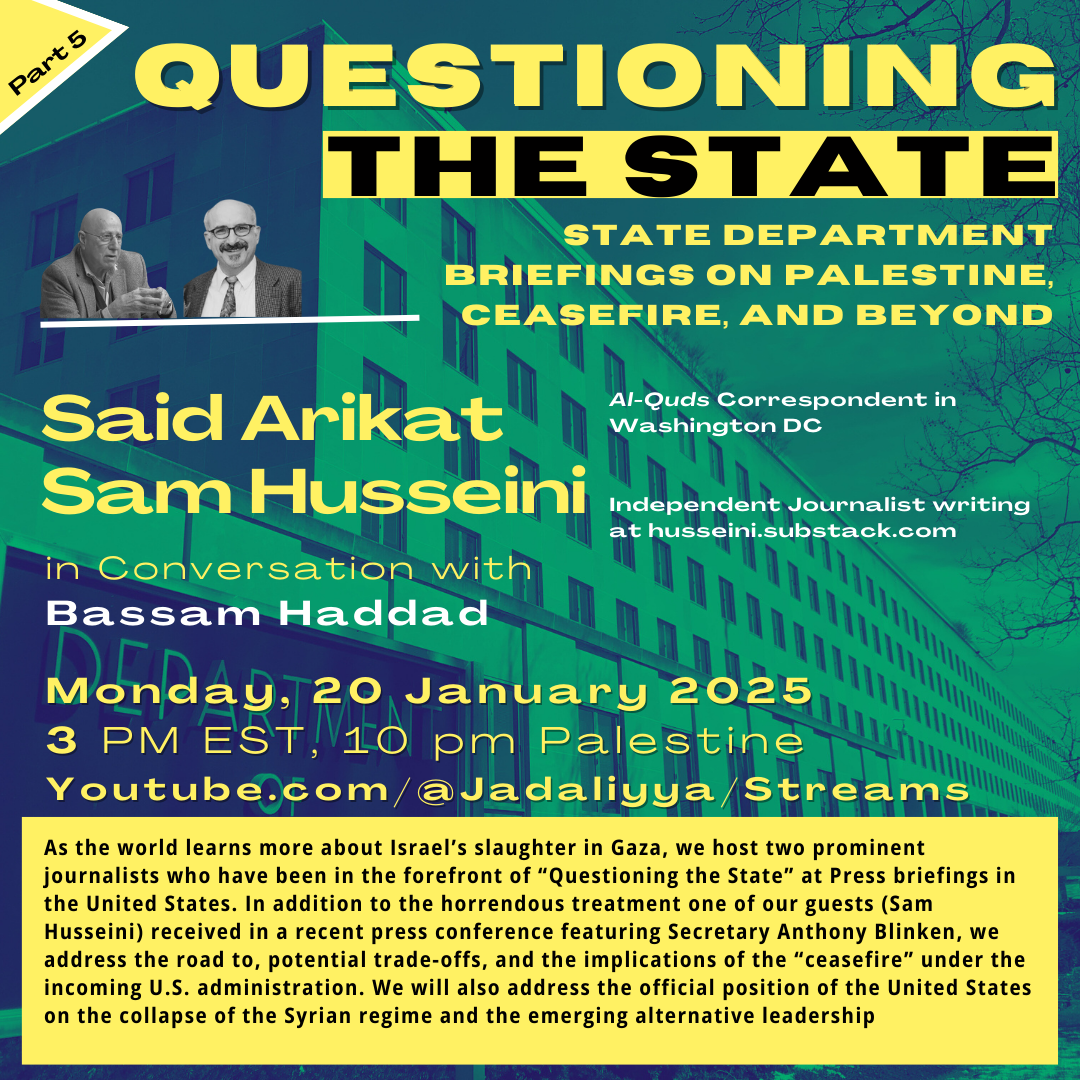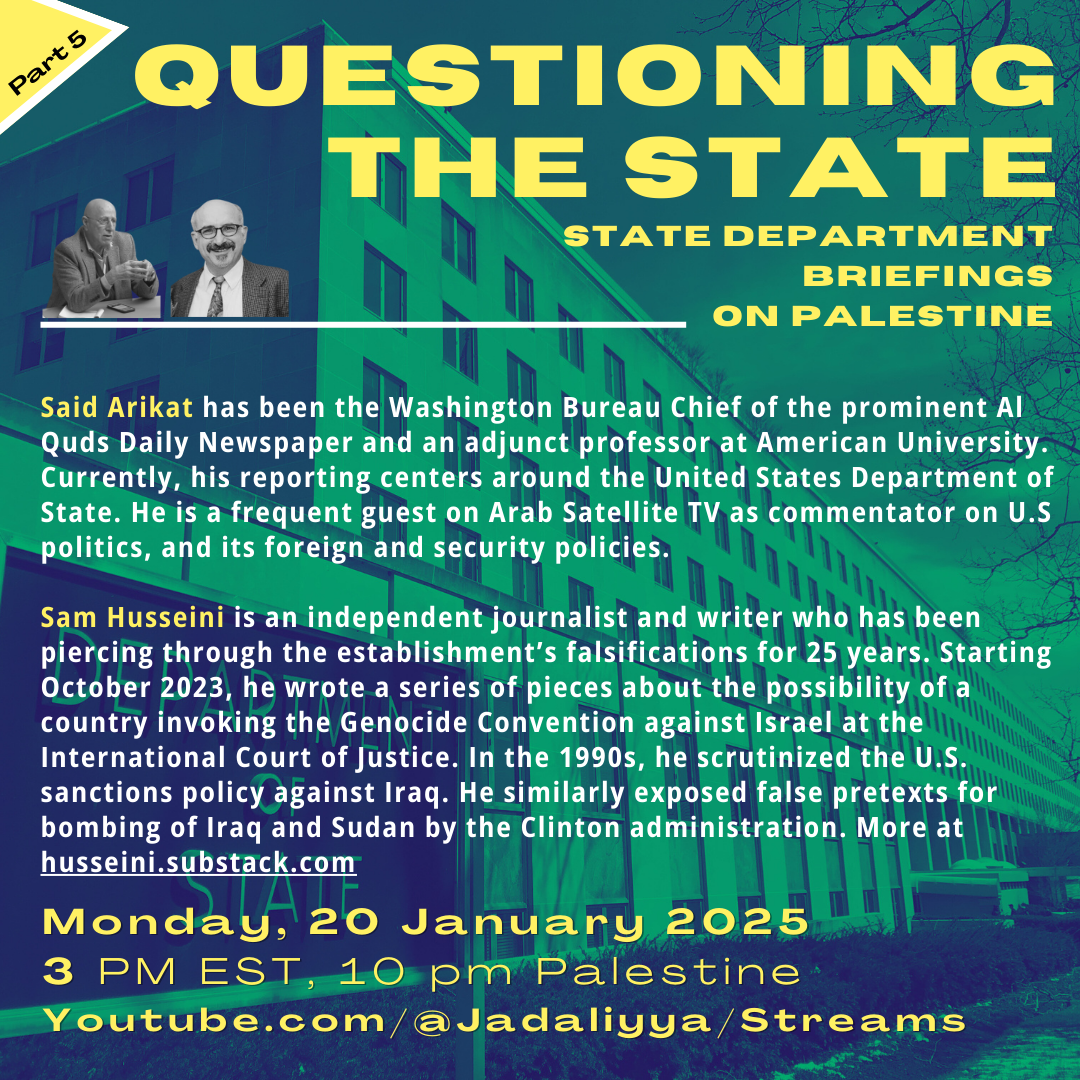Gaza in Context: A Collaborative Teach-In Series
Questioning the State
State Department Briefings on Palestine, Ceasefire, and Beyond
Featuring:
Said Arikat
Sam Husseini
Moderator:
Bassam Haddad
Monday, 20 January 2024
3:00 PM EST | 10:00 PM Palestine
As the world learns more about Israel’s slaughter in Gaza amid a cautious ceasefire, we host two prominent journalists, Said Arikat and Sam Husseini, who have been in the forefront of “Questioning the State” at Press briefings in the United States. In addition to the horrendous treatment one of our guests (Sam Husseini) received in a recent press conference featuring Secretary Anthony Blinken, we address the road to, potential trade-offs, and the implications of the “ceasefire” under the incoming U.S. administration. We will also address the official position of the United States on the collapse of the Syrian regime and the emerging alternative leadership.
Gaza in Context Collaborative Teach-In Series
We are together experiencing a catastrophic unfolding of history as Gaza endures a massive invasion of genocidal proportions. This accompanies an incessant bombardment of a population increasingly bereft of the necessities of living in response to the Hamas attack in Israel on October 7. The context within which this takes place includes a well-coordinated campaign of misinformation and the unearthing of a multitude of essentialist and reductionist discursive tropes that dehumanize Palestinians as the culprits, despite a context of structural subjugation and Apartheid, now a matter of consensus in the human rights movement.
The co-organizers below are convening weekly teach-ins and conversations on a host of issues that introduce our common university communities, educators, researchers, and students to the history and present of Gaza, in context.
Co-Organizers: Arab Studies Institute, Georgetown University’s Center for Contemporary Arab Studies, George Mason University’s Middle East and Islamic Studies Program, Rutgers Center for Middle Eastern Studies, Birzeit University Museum, Harvard’s Center for Middle Eastern Studies, Brown University’s Center for Middle East Studies, University of Chicago’s Center for Contemporary Theory, Brown University’s New Directions in Palestinian Studies, Georgetown University’s Center for Muslim-Christian Understanding, Simon Fraser University’s Centre for Comparative Muslim Studies, Georgetown University-Qatar, American University of Cairo’s Alternative Policy Studies, Middle East Studies Association’s Global Academy, University of Chicago’s Center for Middle Eastern Studies, CUNY’s Middle East and Middle Eastern American Center, University of Illinois Chicago’s Arab american cultural Center, George Mason University’s AbuSulayman’s Center for Global Islamic Studies, University of Illinois Chicago’s Critical Middle East Studies Working Group, George Washington University’s Institute for Middle East Studies, Columbia University’s Center for Palestine Studies, New York University’s Hagop Kevorkian Center for Near Eastern Studies


Featuring
Said Arikat has been the Washington Bureau Chief of the prominent Al Quds Daily Newspaper and an adjunct professor at American University. Currently, his reporting centers around the United States Department of State. He is a frequent guest on Arab Satellite TV as commentator on U.S politics, and its foreign and security policies. From the summer of 2005, he served as the United Nations Chief Spokesman for Iraq and was based in Baghdad 2005-2010. He traveled and worked in every region/city in Iraq and became intimately involved with the Constitution and the 10 different national and regional elections that occurred during his tenure there. Said holds a B.S degree from the University of San Francisco and an M.S degree from California State University in Long Beach.
Sam Husseini is an independent journalist and writer who has been piercing through the establishment’s falsifications for 25 years. Starting October 2023, he wrote a series of pieces about the possibility of a country invoking the Genocide Convention against Israel at the International Court of Justice. In the 1990s, he scrutinized the U.S. sanctions policy against Iraq. He similarly exposed false pretexts for bombing of Iraq and Sudan by the Clinton administration. More at husseini.substack.com
Bassam Haddad (Moderator) is Director of the Middle East and Islamic Studies Program and Associate Professor at the Schar School of Policy and Government at George Mason University. He is the author of Business Networks in Syria: The Political Economy of Authoritarian Resilience (Stanford University Press, 2011) and co-editor of A Critical Political Economy of the Middle East (Stanford University Press, 2021). Bassam is Co-Founder/Editor of Jadaliyya Ezine and Executive Director of the Arab Studies Institute. He serves as Founding Editor of the Arab Studies Journal and the Knowledge Production Project. He is co-producer/director of the award-winning documentary film, About Baghdad, and director of the acclaimed series Arabs and Terrorism. Bassam is Executive Producer of Status Podcast Channel and Director of the Middle East Studies Pedagogy Initiative (MESPI). He received MESA's Jere L. Bacharach Service Award in 2017 for his service to the profession. Currently, Bassam is working on his second Syria book titled Understanding The Syrian Tragedy: Regime, Opposition, Outsiders (forthcoming, Stanford University Press).
